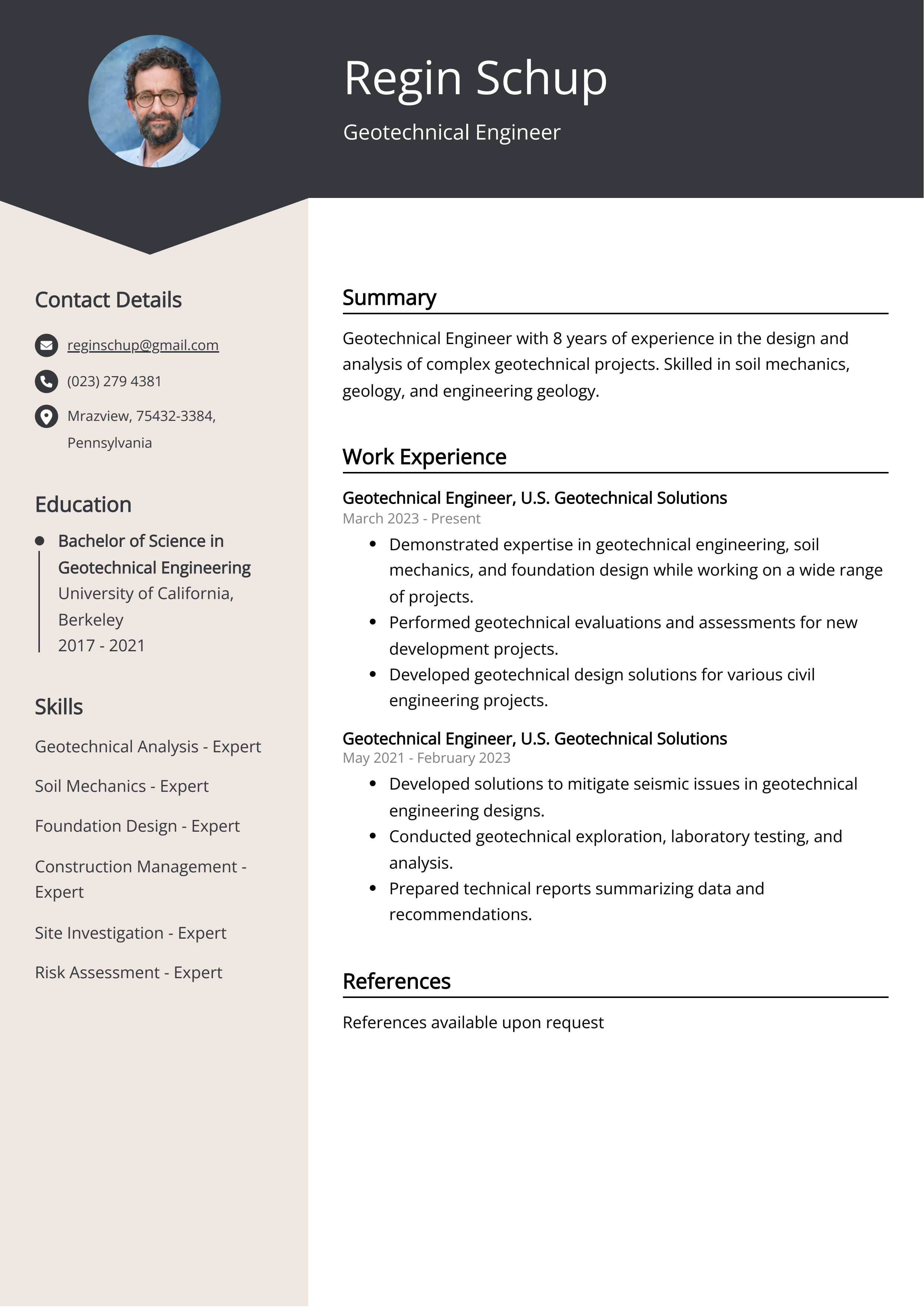How Geotheta can Save You Time, Stress, and Money.
How Geotheta can Save You Time, Stress, and Money.
Blog Article
All About Geotheta
Table of ContentsThe Only Guide to GeothetaThe Best Guide To GeothetaHow Geotheta can Save You Time, Stress, and Money.How Geotheta can Save You Time, Stress, and Money.The Ultimate Guide To Geotheta

They conduct site examinations, accumulate examples, do lab tests, and examine data to examine the viability of the ground for construction tasks - Tailings Engineer. Based on their findings, geotechnical designers offer suggestions for structure layout, slope stability, maintaining frameworks, and reduction of geotechnical dangers. They work together with various other experts, such as architects, architectural engineers, and building and construction teams, to guarantee that geotechnical considerations are incorporated into the overall task style and execution
By assessing the behavior and residential or commercial properties of soil and rock, they can identify potential geotechnical risks such as landslides, dirt negotiation, or incline instability. Their know-how helps stop failings or accidents that might jeopardize lives and home. Here are some in-depth tasks and obligations of a geotechnical designer: Site Examination: Geotechnical designers conduct website examinations to collect data on subsurface problems.
They analyze the data to comprehend the homes and actions of the dirt and rock, including their stamina, permeability, compaction characteristics, and groundwater problems. Geotechnical Analysis and Style: Geotechnical engineers evaluate the information accumulated throughout site examinations to analyze the stability and suitability of the website for construction projects. They perform geotechnical estimations and modeling to review factors such as birthing ability, negotiation, incline security, lateral planet pressures, and groundwater circulation.
Geotheta Fundamentals Explained
Foundation Design: Geotechnical designers play a crucial function in creating foundations that can securely sustain the desired structure. They evaluate the soil problems and load demands to figure out the appropriate structure kind, such as shallow foundations (e.g., grounds), deep structures (e.g (https://geotheta.godaddysites.com/f/why-geotechnical-engineers-are-your-projects-best-friends)., heaps), or specialized strategies like soil improvement. They think about factors such as negotiation limitations, birthing ability, and soil-structure interaction to develop optimal foundation styles
They review building and construction strategies, screen site tasks, and perform field inspections to verify that the design referrals are followed. If unpredicted geotechnical concerns emerge, they assess the scenario and provide referrals for removal or changes to the layout. Threat Analysis and Reduction: Geotechnical designers evaluate geotechnical risks and dangers connected with the job website, such as landslides, liquefaction, or dirt disintegration.

Collaboration and Interaction: Geotechnical designers function carefully with various other experts included in a project, such as engineers, architectural engineers, and construction teams. Reliable communication and cooperation are vital to integrate geotechnical considerations right into the total project layout and building and construction process. Geotechnical engineers offer technological expertise, response inquiries, and make sure that geotechnical demands are met.
All about Geotheta
Here are some sorts of geotechnical engineers: Foundation Engineer: Structure designers concentrate on designing and analyzing foundations for structures. They assess the soil conditions, lots demands, and site characteristics to establish the most suitable structure type and style, such as shallow structures, deep foundations, or specialized strategies like pile foundations.
They assess the elements affecting slope stability, such as dirt homes, groundwater problems, and slope geometry, and develop strategies to protect against slope failures and reduce risks. Earthquake Designer: Earthquake engineers concentrate on analyzing and creating structures to hold up against seismic pressures. They evaluate the seismic risk of a website, assess soil liquefaction potential, and develop seismic layout requirements to ensure the security and resilience of structures throughout quakes.
They perform field testing, gather examples, and assess the collected information to identify the soil residential or commercial properties, geologic formations, and groundwater problems at a website. Geotechnical Instrumentation Designer: Geotechnical instrumentation designers focus on surveillance and measuring the habits of dirt, rock, and structures. They install and preserve instrumentation systems that keep an eye on variables such as dirt settlement, groundwater levels, slope motions, and architectural displacements to analyze performance and give very early warnings of prospective concerns.
The Buzz on Geotheta
They conduct examinations such as triaxial examinations, consolidation tests, direct shear examinations, and permeability tests to collect data for geotechnical analysis and layout. Geosynthetics Designer: Geosynthetics engineers focus on the layout and application of geosynthetic products, such as geotextiles, geogrids, and geomembranes. They use these materials to boost soil stability, enhance slopes, supply drainage options, and control erosion.
They have a tendency to be investigative individuals, which implies they're intellectual, reflective, and analytical. They wonder, systematic, rational, logical, and rational. Some of them are also social, meaning they're kind, charitable, cooperative, person, caring, valuable, understanding, skillful, and pleasant. Does this audio like you? Take our cost-free occupation test to discover if geotechnical engineer is among your leading occupation suits.
In the workplace environment, geotechnical engineers utilize specialized software program devices to perform computations, develop styles, and assess data. They prepare records, testimonial job specifications, communicate with clients and team participants, and coordinate project activities. The office setup provides a helpful environment for research study, analysis, and collaboration with various other professionals associated with the task.
Getting The Geotheta To Work
They often see job sites to perform site examinations, examine geotechnical problems, and collect information for analysis. These gos to entail traveling to different areas, sometimes in remote or tough terrains. Geotechnical designers might execute soil tasting, conduct examinations, and monitor construction tasks to make sure that the geotechnical facets of the task go to this web-site are being applied appropriately.
Geotechnical engineers also function in specialized geotechnical research laboratories. In these centers, they perform experiments, do tests on soil and rock samples, and analyze the engineering properties of the materials. Geotechnical lab engineers work thoroughly in these settings, dealing with screening equipment, operating tools, and videotaping information. They collaborate with various other laboratory personnel to ensure precise and dependable testing results.
Report this page